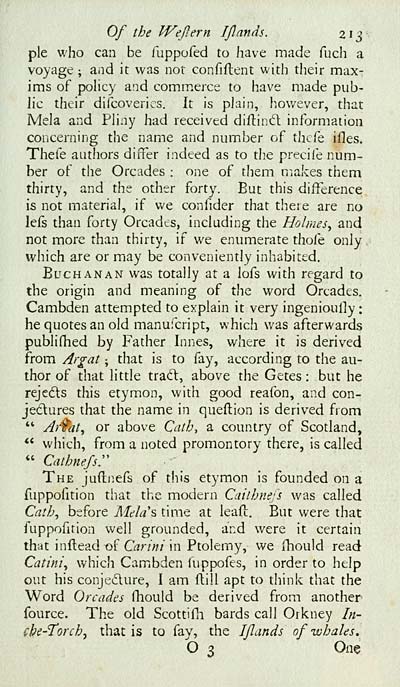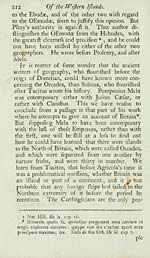Blair Collection > Critical dissertations on the origin, antiquities, language, government, manners, and religion, of the antient Caledonians, their posterity the Picts, and the British and Irish Scots
(251)
Download files
Complete book:
Individual page:
Thumbnail gallery: Grid view | List view

Of the Weflern IJlnnds. 213
pie who can be fuppofed to have made fuch a
voyage ; and it was not confiflent with their max-
ims of pohcy and commerce to have made pub-
lic their difcoverics. It is plain, hov/ever, that
Mela and Pliny had received diftind information
concerning the name and number of thcfe ifles.
Thefe authors differ indeed as to the precife num-
ber of the Orcades : one of them niakes them
thirty, and the other forty. But this difference
is not material, if we confider that tliere are no
lefs than forty Orcades, including the Holmes^ and
not more than thirty, if we enumerate thofe only
which are or may be conveniently inhabited,
Buchanan was totally at a lofs with regard to
the origin and meaning of the word Orcades,
Cambden attempted to explain it very ingenioully :
he quotes an old manufcript, which was afterwards
publifhed by Father Innes, where it is derived
from Atjat ; that is to fay, according to the au-
thor of that little trad, above the Getes : but he
rejeds this etymon, with good reafon, and con-
jedures that the name in queftion is derived from
" Arfat, or above Catl\ a country of Scotland,
** which, from a noted promontory there, is called
" Cathnejsr
The jufti^efs of this etymon is founded on a
fuppofition that the modern Cailbnej's was called
Catb^ before Melas time at leaO:. But were that
fuppofition well grounded, and were it certain
that infteadtif G?n>// in Ptolemy, we fhould read
Catini^ which Cambden fuppofes, in order to help
out his conjedure, I am ftill apt to think that the
Word Orcades fhould be derived from another
fource. The old Scottifh bards call Orkney In-
cbe-Torchy that is to fav, the IJlands of ivbaks.
b 3 One
pie who can be fuppofed to have made fuch a
voyage ; and it was not confiflent with their max-
ims of pohcy and commerce to have made pub-
lic their difcoverics. It is plain, hov/ever, that
Mela and Pliny had received diftind information
concerning the name and number of thcfe ifles.
Thefe authors differ indeed as to the precife num-
ber of the Orcades : one of them niakes them
thirty, and the other forty. But this difference
is not material, if we confider that tliere are no
lefs than forty Orcades, including the Holmes^ and
not more than thirty, if we enumerate thofe only
which are or may be conveniently inhabited,
Buchanan was totally at a lofs with regard to
the origin and meaning of the word Orcades,
Cambden attempted to explain it very ingenioully :
he quotes an old manufcript, which was afterwards
publifhed by Father Innes, where it is derived
from Atjat ; that is to fay, according to the au-
thor of that little trad, above the Getes : but he
rejeds this etymon, with good reafon, and con-
jedures that the name in queftion is derived from
" Arfat, or above Catl\ a country of Scotland,
** which, from a noted promontory there, is called
" Cathnejsr
The jufti^efs of this etymon is founded on a
fuppofition that the modern Cailbnej's was called
Catb^ before Melas time at leaO:. But were that
fuppofition well grounded, and were it certain
that infteadtif G?n>// in Ptolemy, we fhould read
Catini^ which Cambden fuppofes, in order to help
out his conjedure, I am ftill apt to think that the
Word Orcades fhould be derived from another
fource. The old Scottifh bards call Orkney In-
cbe-Torchy that is to fav, the IJlands of ivbaks.
b 3 One
Set display mode to: Large image | Transcription
Images and transcriptions on this page, including medium image downloads, may be used under the Creative Commons Attribution 4.0 International Licence unless otherwise stated. ![]()
| Permanent URL | https://digital.nls.uk/76289372 |
|---|
| Description | A selection of books from a collection of more than 500 titles, mostly on religious and literary topics. Also includes some material dealing with other Celtic languages and societies. Collection created towards the end of the 19th century by Lady Evelyn Stewart Murray. |
|---|
| Description | Selected items from five 'Special and Named Printed Collections'. Includes books in Gaelic and other Celtic languages, works about the Gaels, their languages, literature, culture and history. |
|---|

